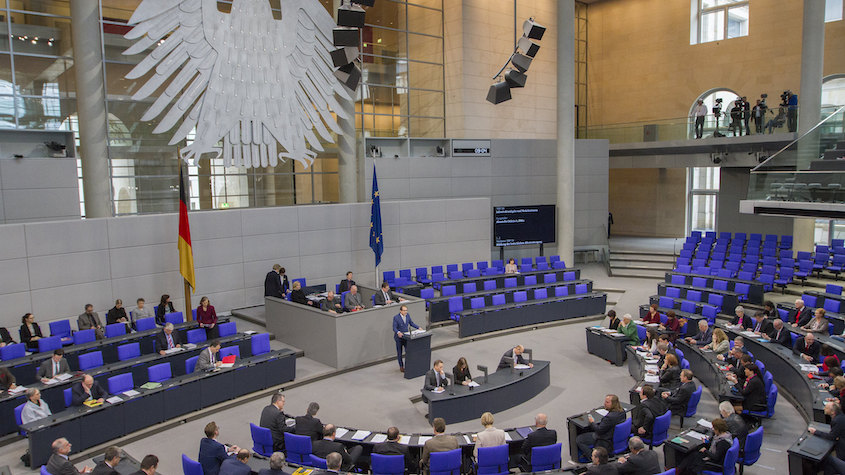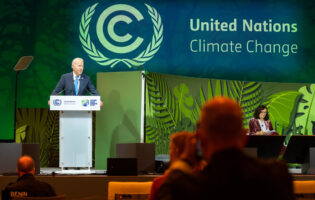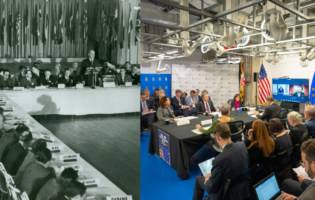
Nudging Germany toward a More Strategic Economic Role

Peter S. Rashish
Vice President; Director, Geoeconomics Program
Peter S. Rashish, who counts over 25 years of experience counseling corporations, think tanks, foundations, and international organizations on transatlantic trade and economic strategy, is Vice President and Director of the Geoeconomics Program at AICGS. He also writes The Wider Atlantic blog.
Mr. Rashish has served as Vice President for Europe and Eurasia at the U.S. Chamber of Commerce, where he spearheaded the Chamber’s advocacy ahead of the launch of the Transatlantic Trade and Investment Partnership. Previously, Mr. Rashish was a Senior Advisor for Europe at McLarty Associates, and has held positions as Executive Vice President of the European Institute, on the Paris-based staff of the International Energy Agency, and as a consultant to the World Bank, the German Marshall Fund of the United States, the Atlantic Council, the Bertelsmann Foundation, and the United Nations Conference on Trade and Development.
Mr. Rashish has testified on the euro zone and U.S.-European economic relations before the House Financial Services Subcommittee on International Monetary Policy and Trade and the House Foreign Affairs Subcommittee on Europe and Eurasia and has advised three U.S. presidential campaigns. He is a member of the Board of Directors of the Jean Monnet Institute in Paris and a Senior Advisor to the European Policy Centre in Brussels. His commentaries have been published in The New York Times, the Financial Times, The Wall Street Journal, Foreign Policy, and The National Interest, and he has appeared on PBS, CNBC, CNN, and NPR.
He earned a BA from Harvard College and an M.Phil. in international relations from Oxford University. He speaks French, German, Italian, and Spanish.
__
The Social Democrats have come out on top in yesterday’s German election and are likely to lead the next government. But despite their losses, the Christian Democrats may still have chance to put together a coalition. Whoever heads the next government, it is a near certainty it will include the Greens and the liberal, pro-business Free Democrats.
As the coalition scenarios play out, what are the implications of the German elections for transatlantic economic relations?
In Washington, it can be assumed that the Biden administration was looking at the vote through the prism of the three greatest—and inter-related—challenges it sees facing not only the United States but also Germany and the European Union: China, climate change, and technology.
The U.S. administration is likely to welcome a coalition including the Greens, which would help support its climate goals. And as the FDP has made the digital economy a central plank in its platform, Washington may also hope that its participation in the next government will nudge Germany to play a leading role in the EU on developing a transatlantic approach to strategic technologies.
While a government headed by Social Democratic leader Olaf Scholz is unlikely to diverge greatly from Merkel’s cautious approach to China that values economic engagement, there could be nuances.
The U.S. administration will be watching for how much change the new coalition will bring on China. The Merkel government chose not to make a priority of preparing the German population for hard decisions on how to strike a better balance between its commercial and security interests, especially as far as China is concerned.
While a government headed by Social Democratic leader Olaf Scholz is unlikely to diverge greatly from Merkel’s cautious approach to China that values economic engagement, there could be nuances.
The Green Party, and to a certain degree the FDP as well, like to emphasize the role of values—democracy, human rights, worker rights—in Germany’s foreign and foreign economic policy. That would strike a chord with the Biden administration, which wishes to rally like-minded liberal democracies in the face of the challenge of authoritarianism.
The nexus of trade and climate policies could be a source of friction between the United States and the EU if they take different approaches to taxing carbon-intensive goods at the border. The Greens, however, have spoken of working with the United States on a transatlantic “green free trade area,” so their participation in the next government might help ease tensions if they can influence the direction the EU takes.
Longer term, it will be important to watch how high a priority the next German government makes the new U.S.-EU Trade and Technology Council (TTC), which is slated to meet for the first time on Wednesday in Pittsburgh.
One test will be whether there is increased interest in Berlin in using this new transatlantic forum to work on common approaches to create more resilient supply chains, an issue that crisscrosses foreign policy, economics, trade, public health, human rights, and the environment.
If so, this could mean the next German government (and others in the EU) will need to impose additional restrictions on how their companies operate in foreign markets and with foreign suppliers, including China, in the interest of long-term security.
This would not be as radical a step as some in Germany may portray it to be. Germany has recently strengthened its screening of inward investment in strategic industries, which almost certainly comes at a cost to economic efficiency. More measures of this kind by the next government in Berlin—for example, on export controls—would augur well for relations with Washington.








